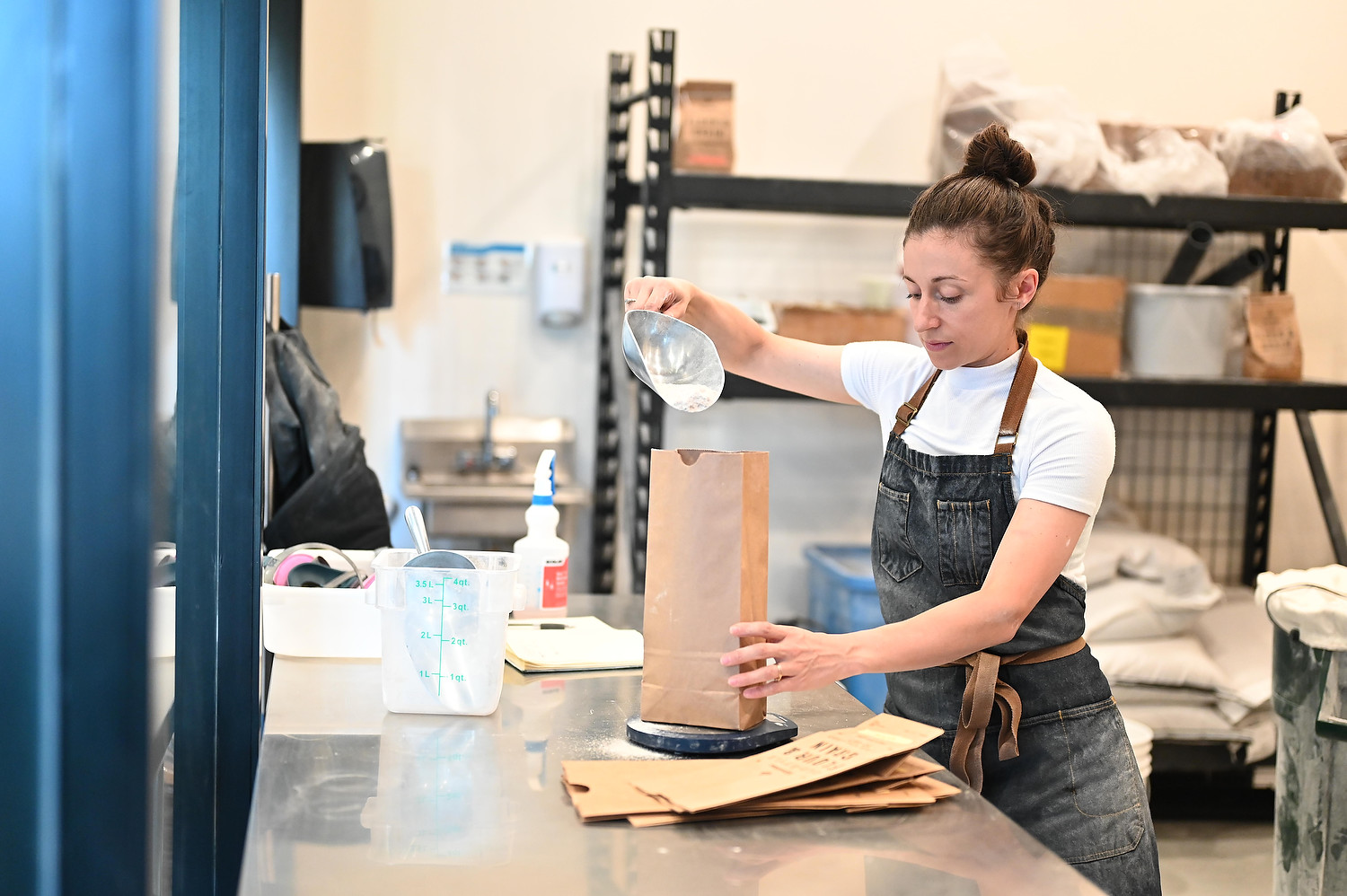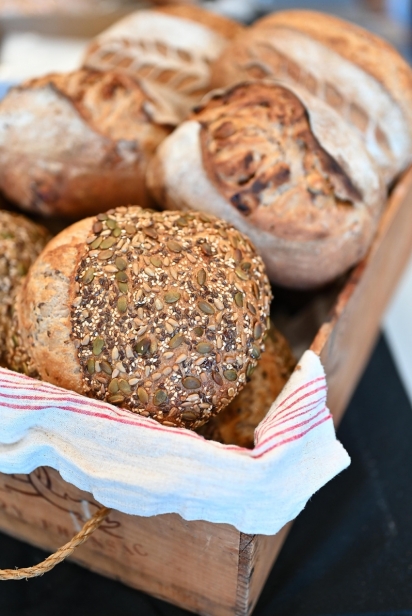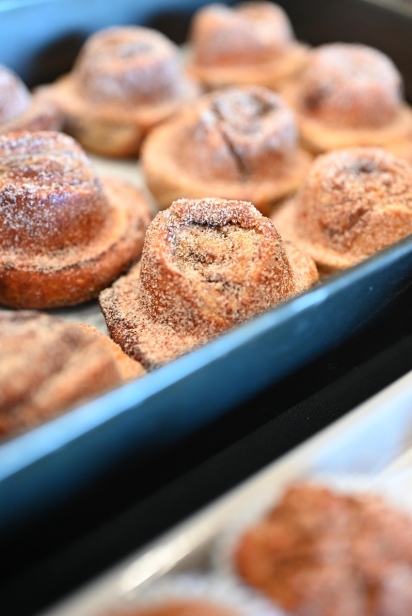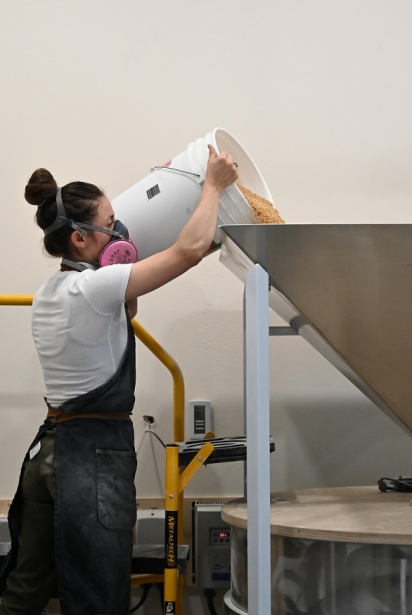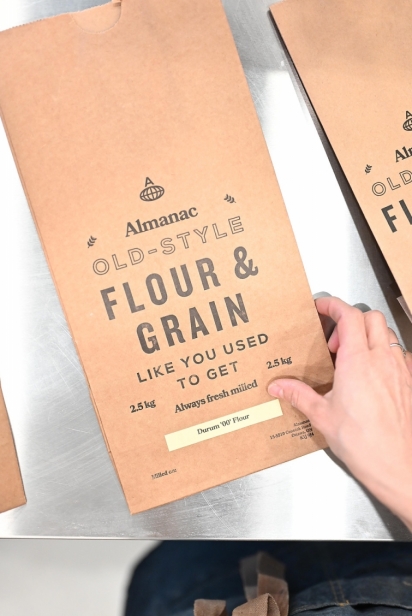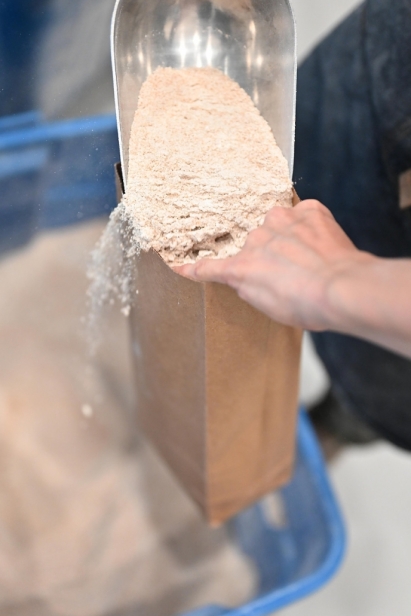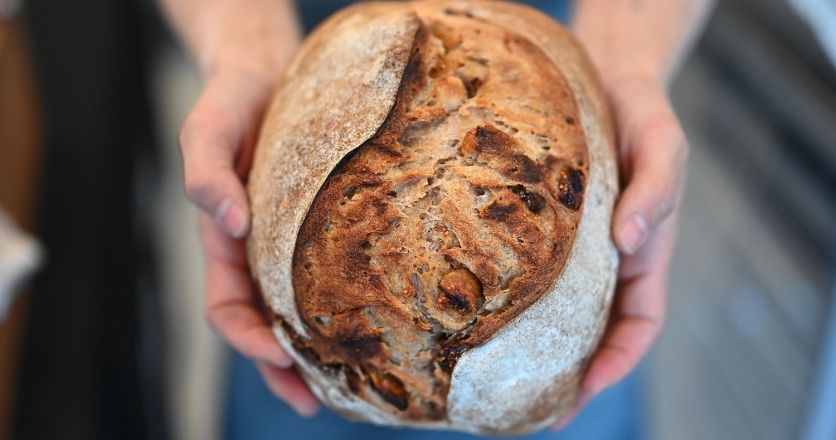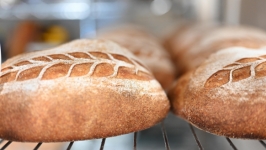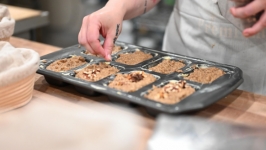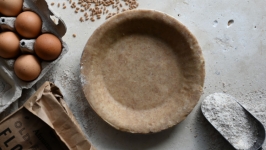'The Base of Everything'
Over the many years that Gabrielle Prud’homme worked in the restaurant industry, she always admired the passion and thoughtfulness that went into food. But at the same time, she felt there was something missing with flour.
“It’s the base of everything,” she explains. “Nobody was paying attention to this. Good things were starting to happen with the local food movement, but not with flour. In 2019, I decided to act on the idea that flour could be better — local, beautiful and fresh. Grain is the missing link.”
After listening to a U.K. podcast on cereal, Prud’homme was inspired; so much so that in 2019, she founded Almanac grains.
“Our mission is to get people thinking about heritage grains and a local grain economy,” she says. “We believe that by growing the demand for good food, we make space for better farming and ultimately create a more sustainable planet.”
A local grain economy is sometimes called a grainshed. This means that local mills produce flour milled from locally grown grains and prices are a reflection of yield, which means that in bad years, when the climate conspires to make harvests hard, the price of grain, flour and bread goes up. This means everyone along the supply chain continues to make a living.
Almanac Urban Mill & Bakery is in the Canotek business park in Ottawa’s east end. The mill and bakery shares a wall with Dominion City Brewing Co. and Prud’homme shares her life with brewery owner Josh McJannett, father to their two young children. Currently, Prud’homme mills fresh flour from heritage grains five days a week, early each morning and sells freshly baked goodies, made in her small on-site commercial kitchen. She also supplies bread and baked goods for Dominion City's patio customers, just a stone’s throw away. Bread and beer make a happy couple.
Prud’homme wants to see a small-scale milling industry flourish, for several reasons. “The more, the better,” she says. “Like the craft brewery industry, the more mills there are, the more this will support farmers to grow heritage grains. And heritage grains replenish the soil, rather than stripping it of nutrients.” They also taste better. A comparison can be made between a supermarket tomato, chilled and shipped from afar, and one sun-warmed and picked directly from the plant. That’s the difference between refined flour commonly found on supermarket shelves and freshly milled, heritage grains.
A few local growers also mill a variety of grains, including Castor River Farm in Metcalfe, Ont. and Against the Grain near Winchester, Ont. Currently, Almanac is buying grains from Sonset Farm, a family-run operation near Inverary, Ont., and Fieldstone Organics in B.C. Prud’homme has also just started a growing relationship with Al DeLong, a farmer based in northwestern Ontario, not far from Dryden. DeLong initially contacted Prud’homme looking for advice on how to start selling flour directly to consumers. He’d been successfully doing so with beef cattle raised on his 326-acre farm, but wanted to know more about the regulatory hoops he’d have to jump through to do this with grains.
“During our conversation, Gaby happened to mention that if I wanted to grow for her, she’d be interested,” DeLong says. So, in the spring of 2021, he planted 10 acres of heritage Red Fife wheat, which he expects to harvest in September, for shipping to Almanac for milling. “I’ve had no experience with Red Fife,” DeLong says, “but I’ve been amazed by it; its germination rate has been good, about 1.3 million plants per acre have come up, which is right where we wanted it, and it has really thrived even though we’ve had a very dry summer.” DeLong has been working with Advancing Eco Agriculture, which aims to help farmers increase yield while improving soil quality, the classic regenerative approach.
Ideally, Prud’homme would love to source more grains in Ontario and Quebec. “Working with local farmers is a more intimate experience,” Prud’homme says. “I can let them know when things change, when, say, there’s too much moisture. In that way, I can really get to know the flour and how the weather, the seasons affect it, in the same way you’d do for a wine.”
While terroir and region are an integral part of wine-making and wine lists in restaurants, Prud’homme understands that the whole bread and flour piece of the puzzle is a huge step for the restaurant industry. An in-house bakery program is a big commitment, not least because it is so time-cons ming. A slow-rise sourdough loaf is 48 hours in the making.
One of Prud’homme’s favourite grains is Red Fife, a wheat Dave Fife began to grow on his farm near Peterborough in 1842, its name derived from the original red colour of the wheat kernel. It’s the oldest wheat grown in Canada and a favourite among artisan bakeries. “I love it for its rich flavour and gorgeous colour. It's an amazing heritage grain to use as an add-in for your bread or straight up for cookies, pancakes and muffins,” Prud’homme says. “Most of our cookies are made with exclusively Red Fife whole grain and the flavour is unbelievable.”
She also mills Hard Red, Hard White, Soft White, Emmer, Khorasan, spelt, rye, durum and rolled oats early in the morning, using her New American stone mill, which came from Vermont. Giant Barre Grey granite discs grind against each other, reducing the grains to their essence. A sifter puffs the results out into cotton bags — fine ground, medium ground (germ) and bran, at which point Prud’homme bags it up in rustic brown paper, stamped with Almanac, an homage to the Farmers’ Almanac, that guide to all things country.
If kept dry and away from pests, grain can be stored for long periods. However, as soon as one mills it with a stone mill such as Prud’homme’s, the bran and oils get mixed through the flour. Over time, this means the properties of the flour change and therefore it’s best to use it while fresh or store it in a cool spot — even in a freezer — to prevent any spoiling of the oils.
Currently, Prud’homme sells her flour through Burrow Shop, Around the Block Butcher Shop, in the Farmhouse Food CSA boxes, through Farmscore.ca, at Bread By Us and Boreal Farm store up in Low, Que. She has two bakers at Almanac and produces a variety of goodies she sells directly from the mill, (check the website for opening times), at the Parkdale Night Market and at the York Street Farmers’ Market on Saturdays. The bakery showcases a different loaf weekly, as well as a regular line of scones, cookies and sourdough focaccia.
“This is not the same thing as your store-bought bread,” Prud’homme explains. “This is a great product. This is living, breathing bread, this is bread produced in community, this is the whole process bread, from grain to milling to baking bread. We want to bring value back to bread and the whole process.”
Almanac Urban Mill & Bakery
9-5510 Canotek Rd., Ottawa, Ont.
almanacgrain.ca | 613.898.3788 | @almanacgrain


